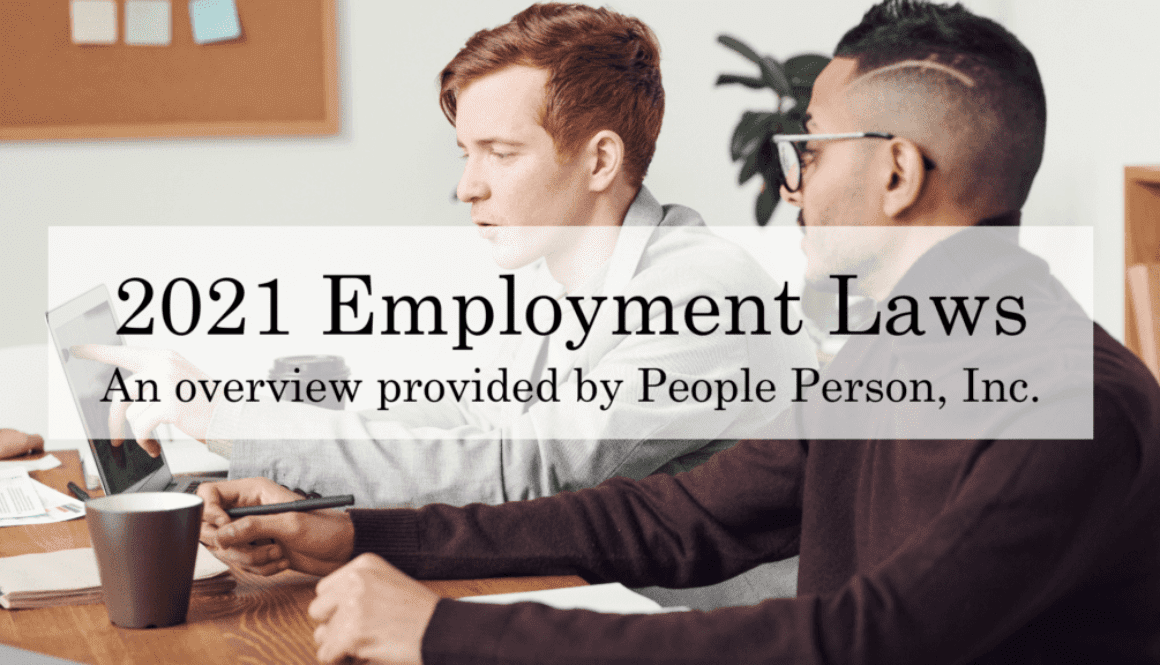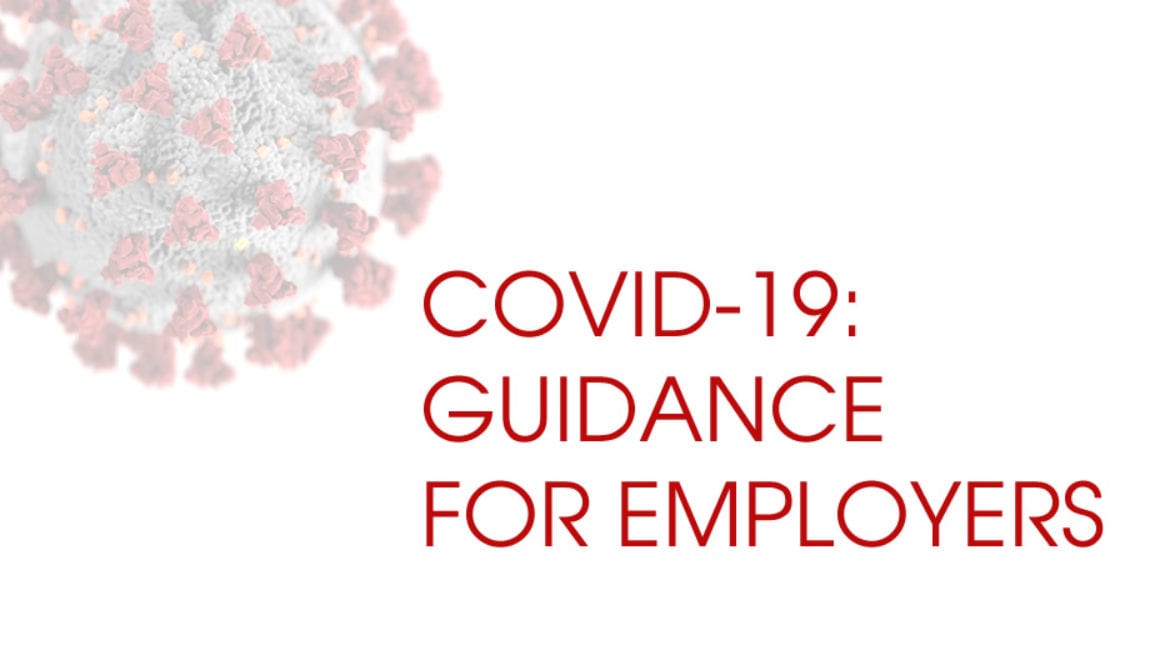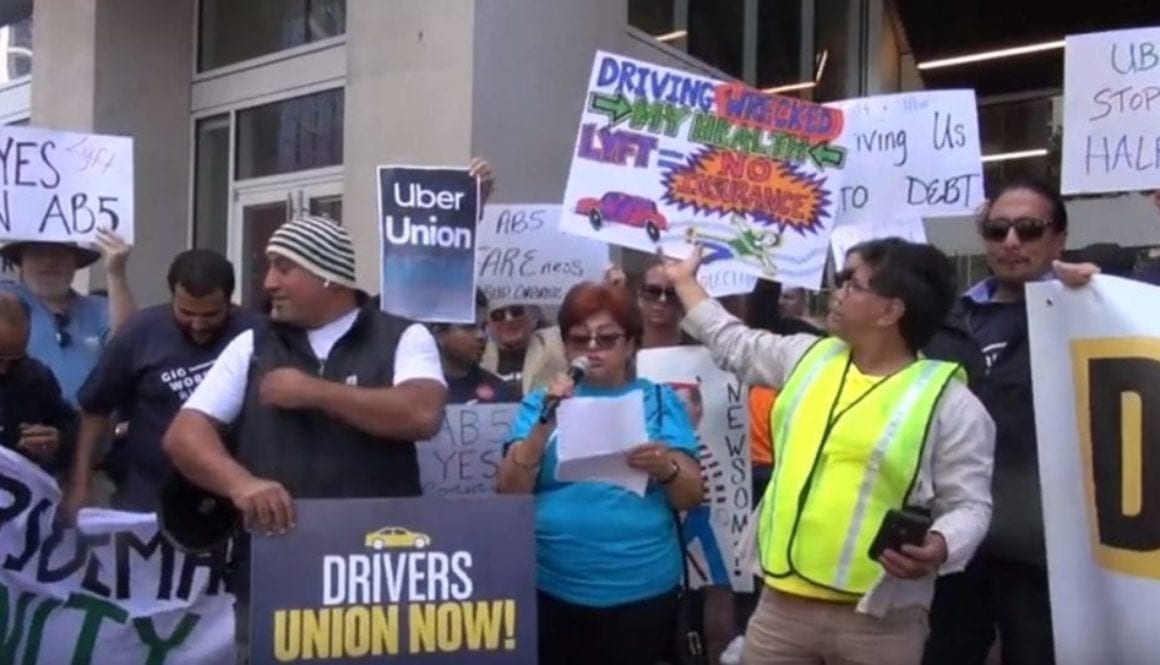2021 Employment Laws
With every new year comes new employment laws. State legislatures and local jurisdictions signed laws in 2020 that took effect on January 1, 2021. The range of employment laws covers everything from pay to harassment to, of course, the hot topic everyone is wanting to know about, the current Coronavirus pandemic.
For your convenience, we have compiled a list of some of the new laws applicable to the workplace, and have summarized them below by state.
Nationwide
Across the US, twenty-one different states are increasing their minimum wage effective January 1, 2021, and several states are set to increase mid-year as well. Local jurisdictions such as Denver, Seattle, New York City, and Albuquerque are also increasing their city-specific minimum wages at the beginning of the year, with cities like Los Angeles and Santa Monica to follow with mid-year increases in July.
Employers should be sure to check with their state or local jurisdiction and adjust their payroll as necessary. Keep in mind that increasing the state minimum wage may also affect the salary threshold for exempt employees. For example, in California, exempt employees must be paid 2x the state minimum wage.
California
Leaves of Absence
SB-1383: EXPANSION OF THE CALIFORNIA FAMILY RIGHTS ACT
The California Family Rights Act (CFRA), which provides family care and medical leave, had previously applied to businesses that employed 50 or more employees within 75 miles of a work location. The expanded CFRA now applies to all California employers of 5 or more without the previous distance limitation. The CFRA has also expanded the definition of “family members” and removed the age limit for qualifying children.
AB-2017: KIN CARE LEAVE
Currently, California law allows employees to take up to half of their sick time to care for a sick family member. This new law clarifies that solely employees have the right to designate any sick time taken to care for a family member as kin care, not the employers.
AB-2399: EXPANSION OF PAID FAMILY LEAVE FOR MILITARY NEEDS
This law expands the definition of “military member” to include a child, spouse, domestic partner, or parent of the employee, for the purposes of care and for time off to be with a family member being deployed for or on leave from active duty.
AB-2992: EXPANDED PROTECTIONS FOR CRIME VICTIMS
This law expands the definition of a crime to include public offenses that caused physical or mental injury, even if no person was arrested for the crime. Additionally, time off work due to one of these situations can include counseling and mental health services or safety/prevention planning related to the offense. It further expands the prohibition of discrimination of victims of crime or abuse beyond existing time off for court proceedings.
Harrassment & Diversity
SB-778: SEXUAL HARASSMENT TRAINING
Ongoing sexual harassment training is now required for all employers of 5 or more. For regular employees, training must be completed within 6 months of hire, or within 6 months of promotion to a supervisory position. Temporary and seasonal employees must be trained within 30 days or 100 hours worked, whichever comes first. Non-supervisors will take a 1-hour training, and supervisors will take a 2-hour training. All training is valid for two (2) years.
AB-979: DIVERSITY OF BOARD MEMBERS
A Board of Directors for a publicly traded company headquartered in or with principal executive offices in California must have at least 1 Director from an underrepresented community by the end of 2021. By the end of 2022, that number is increased to 2 or 3 depending on the size of the board. The law lists out those underrepresented communities a person may self-identify as in order to qualify.
Reporting
AB-685: COVID-19 REPORTING
This new law outlines steps that need to be taken once an employer receives a report of a confirmed or possible exposure to COVID-19. It includes a notice to be given within one business day to eligible employees regarding the potential exposure and cleaning plans. It also requires reporting to local health agencies when 3 or more cases are present in a 14-day period. This law goes even further by establishing Cal/OSHA’s authority to shut down the operations of a business that it deems actively hazardous to employees. Many of the provisions of this new law are covered in the 2020 Cal/OSHA Emergency Standard that is already in effect. The law expires January 1, 2023.
AB-1963: MANDATED REPORTER & TRAINING EXPANSION
For employers of 5 or more who employ minors, human resources employees and frontline supervisors who supervise minors are now mandated reporters. Frontline supervisors would only be mandated to report sexual abuse whereas human resource employees would be mandated to report any type of abuse or neglect. Employers will need to provide their employees who are mandated reporters with training on identification and reporting of child abuse and neglect.
SB-973: PAY DATA REPORTING
All companies that are required to file an annual Employer Information Report under federal law (EEO-1) will also need to submit a pay data report to the Department of Fair Employment and Housing (DFEH) that contains specified wage information. The report must be submitted by March 31, 2021, and annually thereafter.
Legal Matters
AB-2143: NO-REHIRE PROVISIONS EXCEPTIONS
This law allows the inclusion of no-rehire provisions in settlement agreements under certain circumstances, i.e., if the employee who filed the complaint was found to have been engaged in sexual harassment or criminal activity by the employer prior to the employee filing the complaint.
AB-1947: STATUTE OF LIMITATIONS FOR LABOR COMMISSIONER COMPLAINTS
The law extends the current statute of limitations for discrimination and retaliation complaints filed for any law under the jurisdiction of the Labor Commissioner from 6 months to 1 year after a violation. The new law also allows for the courts to award reasonable attorney’s fees to prevailing employees.
Healthcare Industry
AB-2644: SKILLED NURSING FACILITIES STAFFING AND REPORTING
This law requires every skilled nursing facility to have a dedicated, full-time Infection Prevention (IP) staff member position filled by an RN or LVN. The law also requires skilled nursing facilities to annually train their healthcare personnel in infection prevention control and report communicable disease data in the event of a declared communicable disease emergency.
AB-2537: PPE SUPPLY LEVELS AND TRAINING MANDATES IN ACUTE CARE FACILITIES
Taking effect April 1, 2021, the law requires acute care hospitals provide PPE to all employees who provide direct patient care and makes employers responsible for ensuring the use of proper PPE by all employees. The law also sets a minimum on-hand supply threshold of a three-month PPE supply and gives Cal/OSHA the authority to request proof of stockpile inventory with potential civil penalties of up to $25,000.
Nevada
SB-119: SAFETY TRAINING FOR TRADE SHOWS AND CONVENTIONS
This law requires health and safety training for workers and supervisors performing certain work at sites where exhibitions, conventions, or trade shows occur. Workers must obtain certification through an extended OSHA safety course, with certifications being valid for five (5) years, at which time the certification must be renewed.
New York
PAID LEAVE EXPANSIONS:
As of September 30, 2020, New York State requires that employers provide sick leave hours for their employees, which became available for employee use on January 1, 2021. Depending on employer size and income, the sick leave can be either paid or unpaid. Sick leave may be front-loaded or accrued at a rate of 1 hour for every 30 hours worked, with any unused sick leave carried over to the following year.
In order to comply with the state sick leave law, New York City amended its Earned Safe and Sick Time Act (ESSTA). Along with other requirements, the new law eliminates the 120-day employee waiting period and the 80 working hours requirement to use the sick leave.
New York Paid Family Leave (NYPFL) is increasing job-protected, paid time off from 10 weeks to 12 weeks, and employees on NYPFL will now receive 67% of their average weekly wage instead of the current 60%.
TIPPED EMPLOYEES:
New York State has eliminated the tip credit for tipped employees covered under the New York State DOL for Miscellaneous Industries and Occupations (which does not include restaurant and other hospitality workers). Those workers must now be paid the full state minimum wage without consideration of the tips they receive.
Portland, Oregon
The City of Portland enacted an ordinance banning the use of facial recognition technologies used by government and private entities, effective January 1, 2021.
We’re Here to Help!
It can be tricky to navigate all the new employment laws implemented each new year. This article includes a brief overview of 2021 laws, but employers should be sure to review each new law applicable to their business and workers in detail to ensure compliance. If you have any questions or need assistance with HR compliance, don’t hesitate to contact your friendly People Person team!


